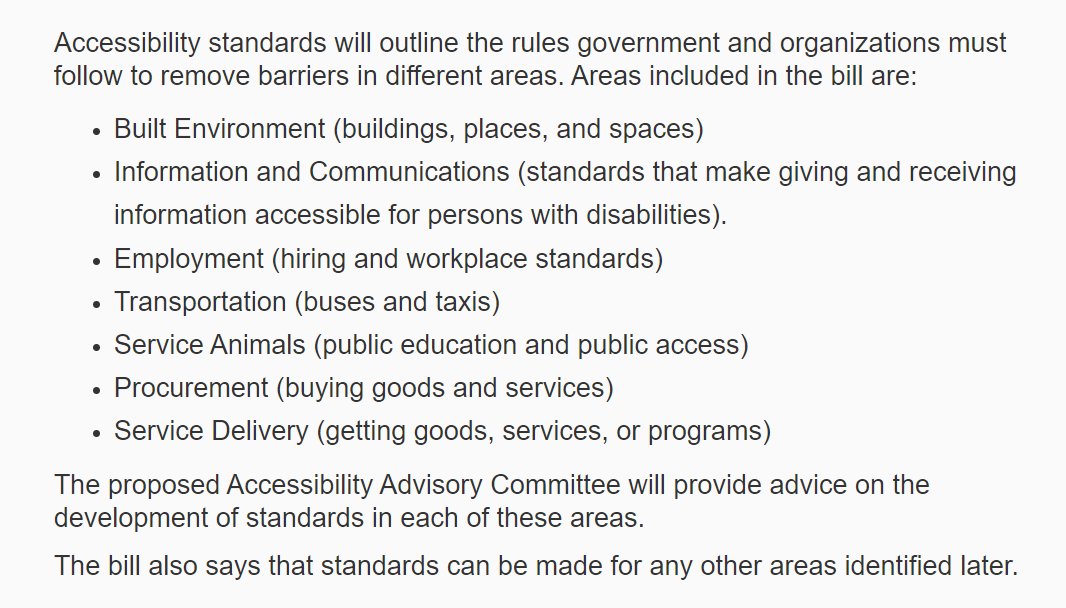Members of several accessibility advocacy organizations say they’re pleased to see the Saskatchewan government moving forward with provincial accessibility legislation, but say any new standards or regulations will be ineffective without strict enforcement.

“Here’s a duty to accommodate, right now, so fix it or it’s a $5,000 fine. Right? That’s what I’m looking to see,” said Saskatchewan Deaf and Hard of Hearing Services Executive Director Nairn Gillies.
“You could use your hearing like that, your sight like that, your spinal cord like that, and then what are you going to do? Rely on the rest of us to be kind to you? That’s not appropriate.”
The Accessible Saskatchewan Act was introduced in the legislature last week, aimed at removing accessibility barriers in the province by setting new accessibility standards to be followed by government and the public sector.
It will apply to areas not covered by the Accessible Canada Act, such as non-federally regulated private sectors, provincially‑owned properties, cities and towns, parks, health care and schools.
The bill specifies the creation of the Saskatchewan Accessibility Office which will be tasked with “providing education on accessibility, increasing public awareness, and monitoring compliance and enforcement.”
Asked about enforcement after the legislation was announced last week, Social Services Minister Gene Makowsky said “this isn’t meant to be a punitive, let’s go after somebody” endeavour, but instead will focus on “education.”
“There is a mechanism for fines but that’s sort of a last resort. That will be, first of all, on the education side, wanting people to understand, but there is a mechanism if required for fines,” Makowsky said.
“You start with the education side of things, and hopefully go from there.”
The draft legislation specifies that the director of the Saskatchewan Accessibility Office will be able apply to a judge of the Court of King’s Bench for an order compelling compliance with the Act.
“Every person who contravenes a provision of this Act, the regulations or an order made pursuant to this Act for which no penalty is otherwise provided, is guilty of an offence and liable on summary conviction to a fine of not more than $250,000,” the bill reads.
Christall Beaudry, CNIB Western Canada vice-president, added “while it’s great to have legislation, we need something that’s enforced”.
“We really want to see enforcement happen, and we really want to see inclusion happen for our communities across the board,” she said.
An advisory committee is also set to be established to help guide the province as it sets new standards.
Launel Scott, representing Spinal Cord Injury Saskatchewan, said such a collective approach is needed to ensure all needs are accommodated.
“There’s a lot of improvements needed for people with physical disabilities,” she said.
“It’s not just about a physical ramp, it’s about visual contrast, communication and access to alternate communication methods.”
There are at least 6,000 people in Saskatchewan with some form of physical disability, an estimated 2,000 severe to profoundly deaf people, and around 40,000 people with some form of sight loss in the province according to the advocates.
Meanwhile, Métis Nation-Saskatchewan Regional Director Marg Friesen said she hopes her community has a seat at the table as the legislation moves forward.
She said gaps in accessibility services are particularly noticeable in northern Saskatchewan, where it can be difficult for those with disabilities to access medical treatment.
“One of the most common barriers is transportation,” she said.
“How people get from their home community to an urban centre for treatment such as diagnostics or specialty appointments becomes a barrier because we do not have resources to ensure public transportation in this province.”
Friesen said she’s also pleased with the progress she’s seen from government so far.
“We need to ensure all of the tools and resources are in place so that we can proceed on how to govern that legislation when it does come to fruition.”
There are approximately 80,000 Métis citizens in Saskatchewan.






Comments